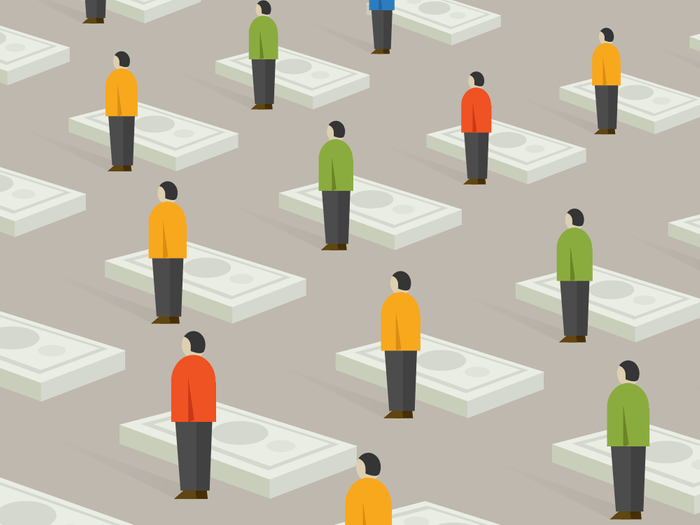4 Ways Universal Basic Income Could Change Canadian Health Care, According to Health Economists

Universal basic income is a buzzy policy term—can it change Canadians’ health and health care system?
When the federal government launched the Canada emergency response benefit (CERB) in the very early days of the pandemic, it renewed calls for a permanent framework for a national basic income program.
Generally, “basic income” or “universal basic income” means a guaranteed livable income that’s provided to everyone in a specific population on a regular basis by the government. There’s debate over how exactly a basic income program should work: Who should be eligible (for example, would there be an income threshold?) how much money should be provided and how it should be funded. But the idea is that everyone has enough to live a modest life, with necessities like basic housing, food and transportation covered.
There are plenty of dissenters who argue that a universal basic income would be “unfair” or dissuade people from working, or that it simply wouldn’t work. However, while the idea of a basic income is meant to combat poverty, it also has an outsized impact on health outcomes.
“What we know is that [economic] shocks [like the pandemic] not only affect people’s health in the current period, but that they have important legacy effects,” says Audrey Laporte, a professor of health economics and the director of the Institute of Health Policy, Management and Evaluation at the University of Toronto. “If you look at the financial crisis of 2008, there is literature that shows that mental health suffered quite dramatically—and these effects linger. There is a link between what happens in the economy and what happens to people’s well-being, and government policy has a role to play in terms of how severe those consequences are going to be.”
Here are 4 ways that a universal basic income program could impact health care in Canada.
Mental health outcomes improve
Turns out that money can, to a certain extent, buy happiness. “One of the key stressors in modern life is finances,” says Evelyn Forget, a professor of community health sciences at the University of Manitoba. Forget points to people who are working multiple jobs with no fixed shifts as an example of a population where mental health outcomes would improve with a UBI. “Trying to live that kind of life while trying to make sure that you can feed your kids, take care of your family and meet your obligations at work is an incredibly stressful way to live,” she says. “The idea of a basic income is like an insurance policy—a sort of peace of mind. If you do need to take some time off work, you can take time off work. You don’t need to work when you’re unable to just to put food on the table.”
Previous basic income experiments, such as the Mincome (meaning minimum income) experiment in the 1970s in Manitoba, found that there was a decrease in mental health-related visits to doctors.
People are more likely to seek out preventative health care
According to Laporte, there’s an increase in the prevalence of chronic diseases when unemployment rates go up. “As good as our health care system is, it really is dealing with the problem once it’s already happened,” she says. “We want to focus on prevention, and I see [basic income programs] as a part of the prevention strategy.”
During a 2017 basic income pilot program in Hamilton, Lindsay and Thunder Bay, Ontario, participants were found to be happier and healthier because of the extra money. They also found it easier to access prescription drugs and other forms of preventative health interventions, with the potential for more long-term health cost savings.
One of the strongest determinants of health is income, says Forget. “One of the things that a basic income would do is make it possible for you to go to the doctor on a regular basis,” she says. So while certain parts of the health care system are being utilized more, like screenings and regular check-ups, people would be accessing recourses resources to stay healthier in the first place so they avoid emergency care.
Hospitalizations may go down
It’s not just mental health outcomes that improve. Hospitalizations also go down. Forget’s analysis of the 1970s’ Mincome experiment found less people were getting into accidents and injuring themselves as well.
In the 2017 Ontario pilot, participants shared stories about how basic income helped them manage their chronic conditions, leading to an overall decrease in visits to the doctor and hospitals. One participant noted that they were able to save up for a mobility device, which drastically cut down the number of doctor visits.
Nutrition and physical health may improve—leading to better health outcomes overall
Having a livable income means being able to move out of an apartment that has black mould, for example. Or, being able to afford fresh food to feed yourself and your family. It also means having the ability to take time off work for leisure, or exercise, or spending time with loved ones—all of which improves mental and physical health. In the 2017 pilot, 85.2 percent of participants surveyed increased the amount of nutritious food consumed—and they were happy to be able to try new things at the grocery store. “If you’ve got a reasonable work-life balance, if you’ve got enough resources to live a reasonable life, it’s a whole lot easier to take a breath and say, ‘okay, now I’m going to pay attention to my diet,’ instead of ‘give me something to eat because my shift starts in 15 minutes,’ and that improves overall health,” says Forget.
“When we give people a stable life, where we reduce the degree of uncertainty, this changes their life in that moment and opens up a whole different life path,” says Laporte.
Next: Caring For My Dying Mom Showed Me That Caregivers Need More Support, Too




